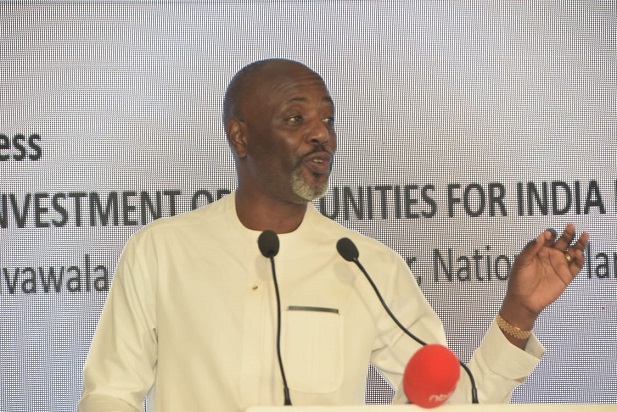By Giu Dennis
Uganda is stepping up its investment diplomacy, with government officials making a strong case to Indian business leaders about why the East African nation is the best destination for their capital.
Dr. Joseph Muvawala, the Executive Director of the National Planning Authority (NPA), delivered this message as keynote speaker at the India–Uganda Trade and Business Forum, held on October 9, 2023, at the St. Regis Hotel in Mumbai. The event was themed “Opportunities Between Uganda and India: Leveraging Uganda Airlines.”
A Stable Investment Climate
Muvawala stressed that Uganda has consistently offered peace, security, and a stable macroeconomic environment for decades—factors that have underpinned investor confidence.
“Uganda’s economy weathered the storms of COVID-19 and remained resilient. We continue to assure price stability and long-term predictability. Beyond that, Uganda provides a highly attractive incentive package—covering tax, land, electricity, and targeted government support,” he said.
Human Capital and a Youthful Market
Uganda’s population is estimated at 48 million people, with over 70% below the age of 30. For investors, this means both an abundant workforce and a rapidly growing consumer base.
“Opportunities are enormous in health, education, apprenticeships, skilling, and labour externalisation. Uganda is strategically positioned to serve as a hub for education and training for the region,” Muvawala explained.
Gateway to East Africa’s 285 Million Consumers
Uganda is land-linked to major economies in the East African Community (EAC), including Kenya, Rwanda, South Sudan, Tanzania, and the Democratic Republic of Congo. The wider EAC population is now estimated at 285 million, creating vast regional market opportunities.
“With this positioning, investors in pharmaceuticals, ICT, housing, education, and consumer goods can tap into a much larger hinterland,” Muvawala said. He also highlighted Uganda’s housing deficit of 2.2 million units as an untapped area of opportunity for investors.
Agriculture and Industrial Growth
Agriculture remains Uganda’s backbone, contributing about 70% of the country’s exports. However, Muvawala acknowledged that value addition is still a challenge—and an opportunity.
“This is where Indian investors can make a difference. From agro-processing to food packaging, there are entire value chains waiting to be developed. More value addition means more jobs, higher incomes for farmers, and greater foreign exchange earnings for the country,” he explained.
On industry, he pointed to untapped opportunities in steel, textiles, cement, pharmaceuticals, fertilizers, edible oils, and motor vehicle assembly. He also flagged growth prospects in mining, and oil and gas, sectors where Uganda is laying foundations for large-scale investment.
Driving Import Substitution
Uganda is also prioritising import replacement, focusing on goods that can be locally produced rather than imported.
“Priority commodities include petroleum products, iron and steel, pharmaceuticals, fertilizers, textiles, packaging materials, transport, and medical services,” Muvawala said. “This approach creates clear opportunities for investors to fill critical supply gaps within Uganda and the wider region.”
Tourism and Natural Endowments
Tourism remains one of Uganda’s strongest yet underutilised assets. The country is home to the rare mountain gorillas, the River Nile, expansive lakes, a rich cultural heritage, and a year-round temperate climate.
“Uganda is the Pearl of Africa—our natural endowments are unique and present a compelling case for investment in the tourism and hospitality sectors,” Muvawala said.
Financing and Partnerships
The NPA chief also invited Indian financiers to explore opportunities in providing long-term and affordable credit for Ugandan projects.
“There is a growing need for innovative financing tools—public-private partnerships, bonds, and concessional loans. Expanding options for long-term capital is crucial for sustaining Uganda’s development,” he said.
Uganda Airlines as a Bridge
Muvawala concluded by urging both sides to leverage Uganda Airlines’ direct flights to Mumbai as a new channel for strengthening business, trade, and cultural ties.
“The airline will facilitate the movement of raw materials, finished products, and people. It’s a vital connector between our two countries,” he said.
Strengthening Bilateral Relations
Uganda’s High Commissioner to India, Prof. Joyce Kakuramatsi Kikafunda, hailed the new direct air link as a “game changer” in bilateral relations.
“Instead of travelling for more than 10 hours through third countries, people can now fly directly between Uganda and India in just six hours. This will enhance trade, medical tourism, technology transfer, cultural exchange, and investment flows between our two nations,” she said.
Prof. Kikafunda expressed gratitude to Uganda Airlines and the Civil Aviation Authority for their role in making the milestone possible.
Looking Ahead
Uganda’s pitch to Indian investors is clear: the country offers youthful talent, regional access, natural wealth, and unmatched incentives. With direct connectivity now in place, the government believes the stage is set for a deeper economic partnership that could transform both economies.




